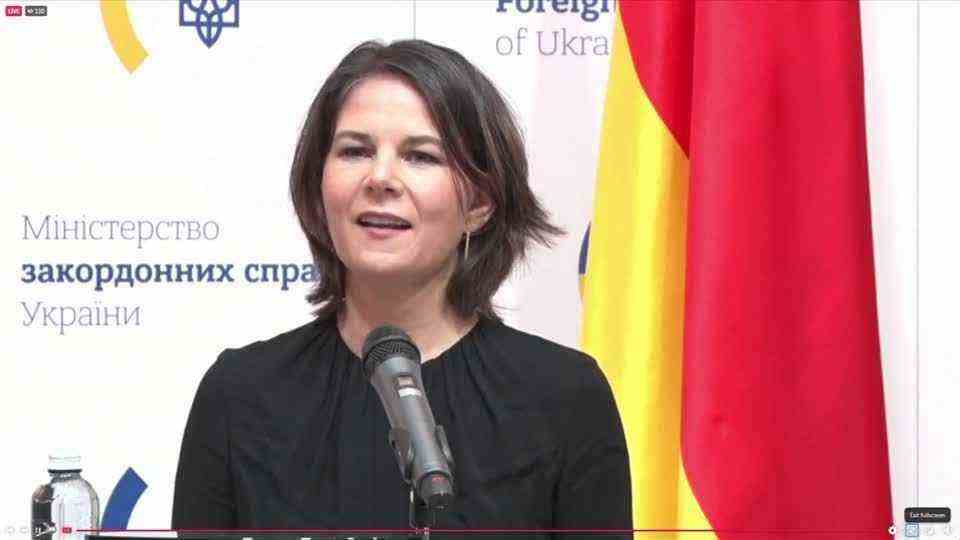German-Russian Relations
After a visit to Moscow: Baerbock wants speedy peace talks in the Ukraine conflict
Federal Foreign Minister Annalena Baerbock
© Maxim Shemetov / DPA
At the first meeting with her Russian colleague Sergey Lavrov, Foreign Minister Annalena Baerbock urges early peace talks in the Ukraine conflict. The relationship between Moscow and Berlin is currently at a low point.
At a meeting with her Russian colleague Sergey Lavrov, Federal Foreign Minister Annalena Baerbock spoke out in favor of a speedy resumption of peace negotiations in the Ukraine conflict. This is important for security in Europe, the Greens politician told journalists after her meeting with Lavrov on Tuesday in Moscow. To this end, a next meeting should be held in the Normandy format – i.e. mediated by Germany and France with Ukraine and Russia. Lavrov stressed that Russia does not see itself as a party to the conflict.
“Now it is important to breathe life into the Normandy process again,” said Baerbock – as he did the day before during her visit to Ukraine. It is good that everyone has committed to the Minsk peace plan. The peace plan agreed in the Belarusian capital in 2015 for the conflict in eastern Ukraine has long been on hold. Ukraine and Russia accuse each other of violating the agreement. mediate between Berlin and Paris.
Annalena Baerbock for meetings at Normandy level
Baerbock said there are different perspectives on the deal. She wants to do everything to ensure that a meeting at Normandy level comes together quickly. Lavrov made it clear: “For us it is not important when we meet, but why we meet.” He once again accused Kiev of not implementing the decisions of the last meeting in Paris at the end of 2019. Lavrov said Russia welcomes US help in a conflict because Washington has the most leverage over the “Kiev regime.”
Regarding the security guarantees to the West demanded by Russia, Baerbock said: “We are ready for a serious dialogue about mutual agreements and steps that will bring more security to everyone in Europe.” The talks between the NATO-Russia Council and the Organization for Security and Co-operation in Europe (OSCE) were the first steps in the past week. Lavrov explained that Russia is now waiting for written proposals from the West. Russia had demanded an end to NATO’s eastward expansion and a waiver of Ukraine’s admission to the alliance.
The US and NATO have been complaining about a massive deployment of Russian troops near the Ukrainian border for months. They fear that Russia could plan an invasion of the neighboring country. Russia has repeatedly denied this. Baerbock said to the Russian soldiers at the border: “It’s hard not to see that as a threat.” Lavrov replied that these are their own troops on their own territory, undergoing combat training.
These women and men rule Germany
17 images
German-Russian relations are currently at a low point
“Germany has a fundamental interest in maintaining the European peace order, in which the same and binding rules apply to everyone and on which everyone can rely,” said Baerbock. “There will be no security in our house of Europe unless there are common rules.”
It was Baerbock’s first personal meeting with the Russian foreign minister since the federal government took office in December. Relations between Moscow and Berlin are currently at a low point due to various conflicts. There is no alternative to a good relationship between Moscow and Berlin, said Lavrov. The Green politician made a similar statement.
After the murder of a Georgian in Berlin’s Tiergarten in August 2019, a court convicted a Russian and accused Moscow of “state terrorism”. The two countries expelled each other’s diplomats. Germany holds Russia responsible for hacker attacks on the Bundestag in 2015 and for the attack on Kremlin opponent Alexei Navalny with the internationally banned chemical warfare agent Novichok. In addition, Moscow is angry about the broadcast stop for the German program of its state broadcaster RT.
Before the meeting, Baerbock laid a wreath at the Tomb of the Unknown Soldier in Moscow – for the victims of World War II. This is considered an important gesture in Russia. She was aware of the “deep historical dimension of the relationship between our two countries,” said the Foreign Minister, emphasizing: “The historical depth and also the historical pain between our two countries is always a task for politics today and for future generations.”


